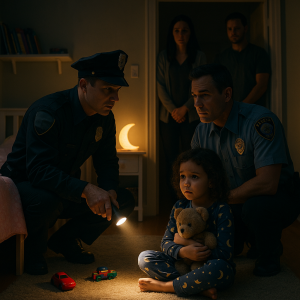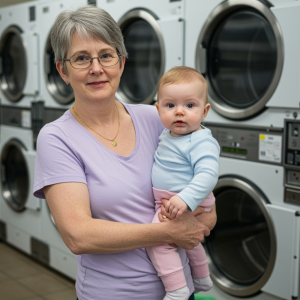The Unspoken Truth
Golden autumn light streamed through the towering courthouse windows, painting geometric patterns across the cold marble floor. In the corridor outside Judge Harrison’s chambers, nine-year-old Emma Chen perched on the edge of a wooden bench, her tiny fingers nervously pleating the fabric of her carefully chosen dress—navy blue dotted with miniature silver stars that her foster mother had lovingly selected the evening before. At her feet lay a magnificent German Shepherd named Atlas, his deep amber eyes methodically surveying each passerby with the quiet intensity of a seasoned sentinel.
For fourteen long months, Emma had called the Morrison household home—ever since that terrifying night when police discovered her cowering in a bedroom closet while her stepfather Marcus faced arrest on charges of domestic violence. The allegations against Marcus had been severe: assault, child endangerment, and repeated violations of protective orders. Yet somehow, his skilled attorney had negotiated a plea that resulted in merely six months behind bars followed by supervised probation.
Now Marcus was back, petitioning the court for Emma’s return to his custody. His argument centered on completion of mandatory anger management courses and substance abuse treatment. As her legal guardian—having wed Emma’s mother just before her tragic death in an automobile accident two years prior—he claimed rightful authority to raise his stepdaughter. What the legal system failed to grasp was that Emma’s profound silence stemmed not from mere shyness or grief, but from an instinct for self-preservation.
“Emma?” The familiar voice of Dr. Sarah Walsh, Emma’s dedicated child psychologist, broke through her anxious thoughts. The woman who had been guiding her healing journey since her placement with the Morrisons approached with characteristic warmth. “How are you managing today, sweetheart?”
Emma’s response emerged as barely more than a breath. “Frightened.”
Immediately, Atlas adjusted his position, moving closer until his substantial frame pressed gently against her legs. The specially trained therapy dog had joined Emma’s support team eight months earlier, after conventional counseling approaches had proven insufficient for helping her process her traumatic experiences. Unlike the well-meaning therapists and social workers whose direct questions often overwhelmed her, Atlas offered something simpler yet more profound: unwavering presence and an intuitive understanding that safety must precede healing.
The relationship between girl and guardian had developed with painstaking slowness but remarkable depth. Initially, Emma had recoiled from Atlas’s imposing size, her trauma having taught her to fear anything large or potentially dangerous. But Atlas possessed specialized training in working with survivors of abuse, along with an almost mystical ability to read human emotional states. He never rushed his approach, never demanded interaction, and seemed to comprehend that trust required patience and consistency.
Their breakthrough had occurred during a violent thunderstorm three months after Atlas’s arrival. Emma had been wrestling with particularly vicious nightmares about Marcus, unable to find peace in sleep. When lightning began illuminating her bedroom window in harsh, irregular flashes, she experienced a panic attack—the electrical display triggering memories of nights when Marcus would stumble home intoxicated and volatile.
Atlas, whose usual sleeping spot was the hallway outside her room, had somehow detected her distress. Without invitation or encouragement, he had nudged open her partially closed door and positioned himself strategically between her bed and the storm-lit window. Then he had performed something extraordinary—he had begun demonstrating the deep, measured breathing technique designed to help humans regulate their respiratory patterns during anxiety attacks.
Emma had watched in wonder as the powerful dog modeled the calming strategy that months of therapy sessions had failed to teach her. Gradually, almost unconsciously, she had begun synchronizing her breathing with his steady rhythm. Within minutes, her panic had dissolved, and she had drifted into peaceful sleep with her small hand resting on Atlas’s broad shoulder.
From that pivotal night forward, Emma and Atlas had developed their own sophisticated communication system. She discovered that Atlas could differentiate between various types of emotional distress and respond appropriately to each. General anxiety prompted him to move closer and offer comforting contact. Specific trauma flashbacks caused him to create a physical barrier between Emma and whatever triggered her fear. When she felt completely overwhelmed, he would perform the breathing demonstration that helped restore her equilibrium.
But it was Emma who had unknowingly taught Atlas the most critical skill of all—how to identify when someone posed a genuine threat to her wellbeing.
This education had begun inadvertently. During supervised visits with various extended family members, Emma had unconsciously developed physical responses to individuals who activated her trauma responses. A subtle shoulder tensing when her maternal uncle’s voice rose unexpectedly. An instinctive backward step when a family friend invaded her personal space. A particular hand positioning when someone’s demeanor reminded her of Marcus’s unpredictable temperament.
Atlas, with his extensive training in interpreting human body language, had learned to recognize these minute signals. More significantly, he had learned to respond in ways that provided Emma with protection and advocacy she couldn’t secure for herself.
The custody hearing was scheduled for ten o’clock, and as they waited in the hallway, Emma could observe Marcus through the courtroom’s glass doors. He appeared transformed from the man in her memories—cleaner, more controlled, wearing professional attire that projected respectability and reformation. But when he turned and noticed her through the transparent barrier, his expression shifted momentarily. It was a fleeting change—a hardening around the eyes, a barely perceptible lip curl—that lasted mere seconds before he resumed his carefully crafted composure.
But Emma registered it. And crucially, Atlas witnessed her reaction to it.
The German Shepherd’s entire bearing transformed. His ears snapped to attention, his muscles coiled with tension, and his gaze fixed on Marcus with laser precision. He produced no growl or obvious aggressive display, but his message was unmistakable to anyone fluent in canine behavior: this individual represented danger to his protected charge.
“I believe it’s time to proceed,” announced Rebecca Martinez, Emma’s court-appointed advocate. Rebecca had championed Emma’s interests for over a year, understanding better than most adults the challenges traumatized children face when attempting to articulate their fears within legal frameworks.
The courtroom proved smaller than Emma had anticipated, featuring rich wood paneling and soaring windows that welcomed streams of late-season sunlight. Judge Harrison, a woman in her fifties with silver-streaked hair and compassionate eyes, presided from an imposing bench that emphasized Emma’s diminutive stature.
Marcus occupied a table with his attorney, a polished professional who had already begun arguing that his client deserved an opportunity to rebuild his relationship with his stepdaughter. “Your Honor, Mr. Reynolds has fulfilled every court-mandated requirement. He has successfully completed anger management training, maintained continuous sobriety for fourteen months, and secured stable housing and employment. The fundamental bond between parent and child should not be severed due to past errors that have been properly addressed through comprehensive rehabilitation.”
Emma sat across the room with Rebecca and Dr. Walsh, Atlas resting quietly beside her chair. The dog’s courtroom presence was highly unusual, but Judge Harrison had carefully reviewed his credentials and documentation regarding his therapeutic role in Emma’s recovery process. She had granted special authorization for Atlas to attend, recognizing that Emma might be unable to participate meaningfully without his support.
The hearing’s initial hour consisted of testimony from social workers, therapists, and character witnesses. Marcus’s rehabilitation counselor spoke eloquently about his progress in anger management courses and his demonstrated commitment to becoming a better guardian. His supervisor testified that he had proven himself a dependable employee for eight consecutive months, maintaining punctual attendance and professional relationships with coworkers.
“Mr. Reynolds has exhibited genuine remorse regarding his past conduct,” testified Dr. Patricia Kim, who had overseen his court-mandated therapy sessions. “He has achieved significant progress in understanding the consequences of his actions and developing healthier strategies for managing stress and resolving conflicts.”
However, Dr. Walsh presented a contrasting perspective when called to discuss Emma’s progress and continuing needs. “Emma has made exceptional strides in her healing journey over these fourteen months,” she explained. “Nevertheless, she continues experiencing significant trauma responses connected to her experiences with Mr. Reynolds. Her anxiety levels escalate dramatically whenever the prospect of returning to his custody is mentioned.”
Marcus’s attorney immediately challenged this assessment. “Dr. Walsh, isn’t it conceivable that Emma’s resistance to reuniting with her legal guardian stems from her attachment to her current foster placement? Children frequently resist change, even beneficial change, when they’ve formed emotional connections elsewhere.”
Dr. Walsh had anticipated this line of inquiry. “While attachment to foster families certainly can create anxiety about transitions, Emma’s responses to Mr. Reynolds specifically align with trauma reactions rather than general separation anxiety. Her behavioral patterns indicate she perceives him as a source of danger rather than security.”
“But you haven’t observed Emma and Mr. Reynolds interacting recently,” the attorney pressed. “How can you evaluate their current relational dynamic based solely on her responses to the theoretical concept of returning to his custody?”
The point was valid and highlighted the central challenge of Emma’s case. Because she remained largely nonverbal about her experiences and because Marcus had successfully completed his rehabilitation requirements, the court possessed limited concrete evidence supporting their continued separation.
Judge Harrison had been listening attentively to all testimony, reviewing case files and psychological evaluations with the thoroughness such decisions demanded. “I would like to witness an interaction between Emma and Mr. Reynolds,” she announced. “Nothing formal or extended, but I believe it would be beneficial to observe how they communicate after this separation period.”
Emma’s heart began pounding the moment these words registered. Rebecca had prepared her for the possibility of being asked to interact with Marcus, but anticipating something and actually confronting it were vastly different experiences.
“Emma,” Judge Harrison said gently, “I’m going to ask Mr. Reynolds to approach and greet you. You’re not required to respond if you prefer not to, but I’d like to observe how you two relate to each other. Would that be acceptable?”
Emma nodded because she understood that compliance was expected, but her entire body tensed with dread. Atlas, who had been lying peacefully throughout the proceedings, immediately detected her emotional shift. His head lifted, his ears perked forward, and his attention focused on Emma’s face as he interpreted the subtle indicators of her distress.
Marcus rose and approached their table with the deliberate movements of someone attempting to appear non-threatening. He had clearly received coaching on interacting with Emma in this environment—his voice was gentle, his posture relaxed, and his expression conveyed warmth and regret.
“Hello, Emma,” he said, stopping approximately three feet from her chair. “You look wonderful. I’ve truly missed you.”
Emma’s response was nearly inaudible. “Hello.”
“I know things were extremely difficult before,” Marcus continued, his voice carrying apparent genuine remorse. “I want you to understand that I’ve been working incredibly hard to improve myself. I’ve learned a great deal about who I am, and I want to repair things between us.”
As he spoke, Emma’s body language began changing in ways barely perceptible to most observers. Her shoulders drew upward slightly, her breathing became shallower, and her hands, which had been resting calmly on her lap, moved to grip her chair’s edge. These were subtle signals—the kind traumatized children learn to suppress to avoid provoking their abusers’ anger.
But Atlas had been specifically trained to recognize exactly these types of responses. More importantly, Emma had unconsciously educated him that these particular physical changes signaled her encounter with the specific source of her trauma.
The German Shepherd rose slowly, his movement fluid yet purposeful. He positioned himself between Emma and Marcus—not aggressively, but unmistakably. His body language conveyed alertness while maintaining control—he displayed no teeth or growling, but every aspect of his posture communicated protection and vigilance.
Marcus retreated a step, clearly uncomfortable with the dog’s focused attention. “I don’t understand why she requires that animal,” he said to Judge Harrison. “Dogs can be unpredictable, particularly around children.”
The comment was revealing in ways Marcus likely didn’t intend. Judge Harrison had been observing the interaction carefully and had noted the precise timing of Atlas’s response to Emma’s subtle distress signals.
“Mr. Reynolds,” she said, “Atlas is a highly trained therapy dog who has been working with Emma for months. His behavior is actually quite predictable—he responds to Emma’s emotional needs. What I’m witnessing is that Emma appears to experience anxiety specifically in your presence, and Atlas is responding to that anxiety.”
“Respectfully, Your Honor,” Marcus’s attorney interjected, “we cannot base custody decisions on canine behavior. Animals don’t comprehend legal relationships or family dynamics.”
But Dr. Walsh rose to clarify what was actually occurring. “Your Honor, Atlas isn’t making judgments about family relationships. He’s responding to Emma’s trauma responses, which she has unconsciously taught him to recognize through months of therapeutic work. This represents a very sophisticated form of communication—Emma is informing us, through Atlas, that she perceives Mr. Reynolds as a threat to her safety.”
Judge Harrison studied Emma carefully. The child now sat rigidly in her chair, her complexion pale, her breathing rapid and shallow. Atlas maintained his position between her and Marcus, his attention divided between monitoring Emma’s condition and tracking Marcus’s movements.
“Emma,” Judge Harrison said gently, “can you tell me how you’re feeling right now?”
Emma’s voice emerged as barely more than a whisper. “Scared.”
“What frightens you?”
Emma glanced up at Marcus, then back at Judge Harrison. For a moment, it seemed she might not respond. But then, in a voice that was quiet yet clear, she said, “Him. I’m afraid of him.”
The words settled in the air like a tangible presence. Marcus’s carefully maintained composure began fracturing. “Emma, you don’t need to fear me anymore,” he said, his voice carrying desperation. “I’m different now. I would never harm you again.”
The word “again” seemed to escape before he could prevent it, and Judge Harrison caught it immediately. “Mr. Reynolds, are you acknowledging that you previously harmed Emma?”
Marcus’s attorney swiftly intervened. “Your Honor, my client has already acknowledged his past mistakes in his rehabilitation documentation. The question before this court is whether he has successfully addressed those issues.”
But the damage was complete. Emma’s reaction to Marcus’s proximity, Atlas’s protective response, and Marcus’s own inadvertent admission had created a picture far more compelling than any written report.
Judge Harrison took considerable time to review her notes and observe the scene before her. Emma remained tense and fearful, Atlas remained alert and protective, and Marcus appeared increasingly uncomfortable under the scrutiny.
“Mr. Reynolds,” Judge Harrison said finally, “I can see that you may have made sincere efforts to address your past behavior. However, the purpose of these proceedings is to determine what arrangement best serves Emma’s interests, not to reward your rehabilitation efforts.”
She turned her attention to Emma, who still sat rigidly with Atlas pressed against her legs. “Emma, sweetheart, I need to ask you a very important question, and I want you to answer as honestly as possible. Do you want to live with Mr. Reynolds?”
Emma’s answer came without hesitation, her voice stronger than it had been all morning. “No. I want to remain with the Morrisons. I want to keep Atlas.”
“Can you explain why?”
Emma looked at Marcus, then back at Judge Harrison. “Because he made my mother cry. Because he destroyed things when he became angry. Because I had to hide in my closet when he came home intoxicated. Because Atlas recognizes when someone is going to hurt me, and he recognizes the danger in him.”
The simplicity and directness of her statement was devastating. This wasn’t rehearsed testimony or manipulated responses—this was a child clearly articulating her fears based on lived experience.
Marcus’s attorney made one final attempt to salvage the situation. “Your Honor, children often struggle to distinguish between discipline and abuse. Mr. Reynolds may have been strict, but that doesn’t necessarily indicate—”
“Counselor,” Judge Harrison interrupted, “I have heard sufficient testimony. Emma has communicated very clearly, both verbally and through her emotional responses, that she does not feel safe with Mr. Reynolds. Her therapy dog, who has been trained to recognize and respond to her trauma triggers, has confirmed what she’s telling us through his protective behavior.”
She paused to review her notes one final time before continuing. “While I acknowledge that Mr. Reynolds has completed his court-mandated rehabilitation programs, I cannot disregard the clear evidence that Emma continues to perceive him as a threat to her safety. The primary consideration in any custody decision must be the best interests of the child.”
Judge Harrison’s voice carried the weight of finality when she announced her decision. “Custody of Emma Chen will remain with her current foster family, the Morrisons, with the recommendation that adoption proceedings commence immediately if they are willing to pursue that option.”
The relief in the courtroom was immediate and palpable. Rebecca gently squeezed Emma’s shoulder, while Dr. Walsh smiled with deep satisfaction at seeing her young patient’s voice finally heard and validated.
Emma looked down at Atlas, who had remained steadfastly by her side throughout the entire ordeal. She reached out to scratch behind his ears, using the specific pattern that meant “thank you” in their private language. The German Shepherd gazed up at her with intelligent eyes that seemed to comprehend everything, his tail wagging slightly—his way of communicating “you’re safe now.”
As they prepared to leave the courtroom, Marcus approached one final time. Atlas immediately tensed, but Emma surprised everyone by addressing her former guardian directly.
“I hope you continue getting better,” she said quietly. “But I can’t help you get better. That’s not my responsibility.”
The wisdom in her words—the understanding that a child shouldn’t be responsible for managing an adult’s healing process—reflected months of therapeutic work and the safety she’d discovered with the Morrison family.
Marcus nodded, perhaps finally grasping that his rehabilitation, while important for his own future, couldn’t erase the fear he had created in Emma. “I’m sorry,” he said simply. “I’m truly sorry for everything.”
“I understand,” Emma replied. “But Atlas is correct. You still make me frightened, and I need to trust that feeling.”
A New Chapter
Six months later, Emma Morrison-Chen stood in the backyard of her permanent home, teaching Atlas new commands while her adoptive parents prepared dinner inside. The legal adoption had been completed without complications, and Emma had begun speaking more regularly, started fourth grade at a new school, and even developed friendships with other children in her neighborhood.
Dr. Walsh continued working with her on processing her trauma, but their sessions now focused more on building Emma’s confidence and teaching her to trust her own instincts about safety and relationships. The partnership with Atlas had shown her that her feelings were valid and that she deserved protection from people who made her feel afraid.
“Atlas taught me something really important,” Emma told Dr. Walsh during one of their sessions. “He taught me that I don’t have to be polite to people who frighten me. I can listen to my feelings and ask for help.”
The therapy dog, who would remain Emma’s companion for years to come, had given her more than emotional support—he had given her a voice when words failed and advocacy when she couldn’t advocate for herself. Most importantly, he had shown her that her safety mattered and that there were adults who would listen to her truth, even when it was difficult to express.
In quiet moments, Emma understood that Atlas hadn’t just been her protector in that courtroom—he had been her translator, helping the adult world understand what she couldn’t articulate about her own experiences. The German Shepherd had bridged the gap between a child’s wordless fear and a judge’s need for concrete evidence, proving that sometimes the most important communication happens through presence, protection, and the unwavering loyalty of someone who truly understands.
The bond between Emma and Atlas continued to deepen as she grew older, their relationship evolving from one of protection and therapy to genuine partnership and friendship. Atlas had taught her that trust was something to be earned slowly and that her instincts about people were worth listening to. In return, Emma had taught him that love could heal even the deepest wounds and that sometimes the greatest courage comes from the smallest voices speaking their truth.
Their story became an example used in training programs for therapy dogs and in education for court officials about alternative forms of communication for trauma survivors. But for Emma, Atlas would always be simply the friend who had helped her find her voice and the courage to use it, proving that healing comes in many forms and that sometimes the most profound advocacy happens without words at all.





